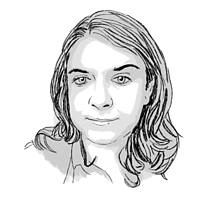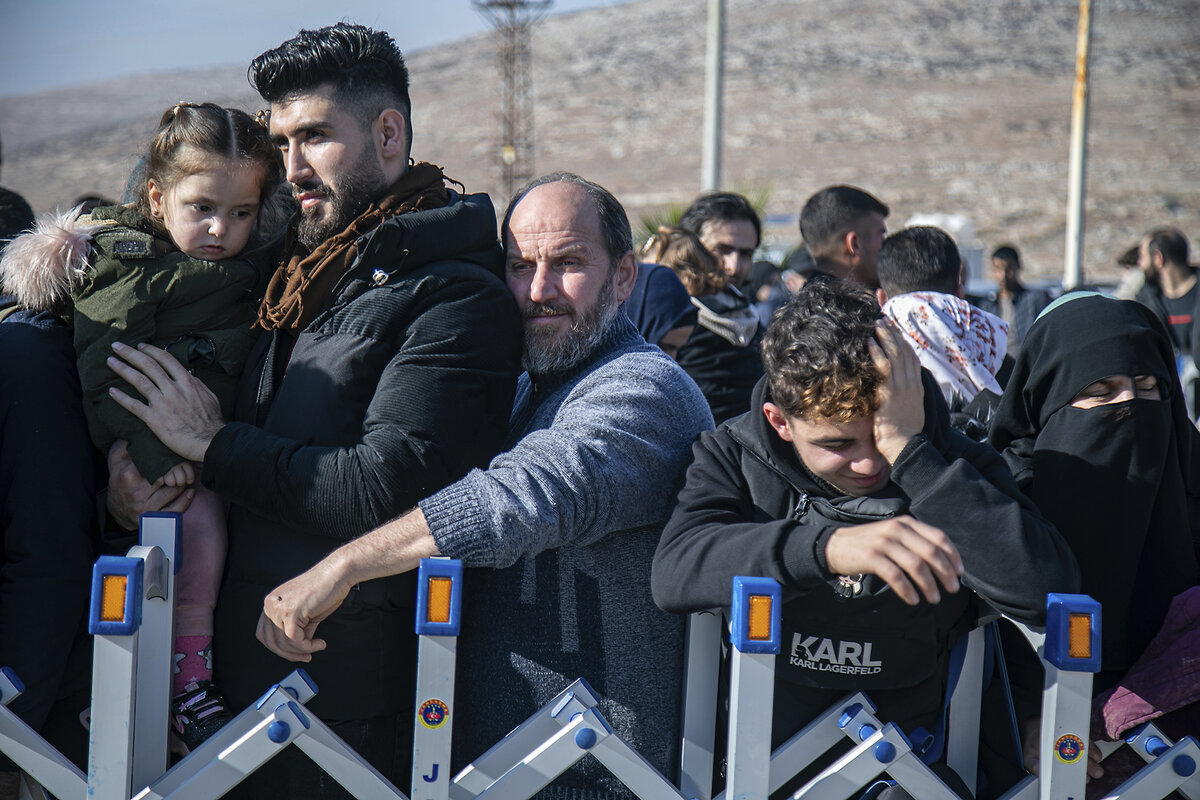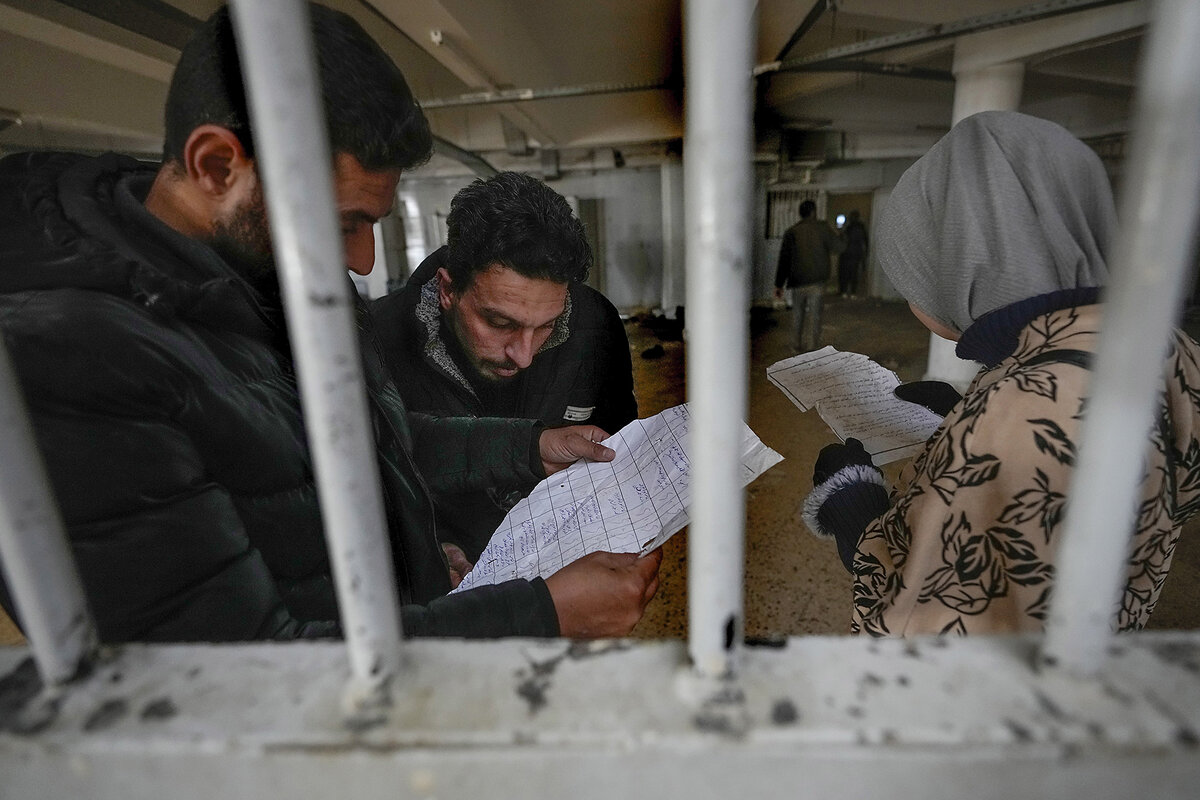For Syrians, Assad is in the past: ‘The thing we all have now is hope’
Loading...
| ATHENS, Greece
Syrians at home and abroad were still reeling Monday that what long seemed impossible – the overthrow of President Bashar al-Assad’s brutal regime – took place in just a matter of hours this weekend.
After years of sectarian massacres, intercommunal conflicts, and jihadist violence, Syrian opposition forces that swept into Damascus early Sunday and chased Mr. Assad into exile in Russia are now in control of much of the still-fragmented country.
Why We Wrote This
A story focused onAfter decades of repression, the pace of political change in Syria over the weekend was stunning. But resetting the country’s institutions and reassuring the public will be painstakingly slow.
It’s an inflection point after 53 years of ruthless, repressive Assad family rule. Syrians who exchanged greetings and congratulations as strategic cities fell to the rebels quickly started dreaming of returning to their homes and reuniting with loved ones.
“I am sleepless and so happy,” says longtime Syrian dissident and former political prisoner Anwar al-Bunni in Berlin. “The goal that Syrians gave their blood and life for is achieved,” he says.
For the Syrians who rose up in protest in 2011 and thereafter, Sunday was a triumph that left them wishing for deceased loved ones to be able to witness the moment.
“I can see the joy in people’s faces,” says Radwan, a medical engineer based in Damascus. “The thing we all have now is hope,” he says.
Syrians at home and abroad were still reeling Monday because what long seemed impossible – the overthrow of President Bashar al-Assad’s brutal regime – took place in just a matter of hours this weekend.
After years of civil war that featured sectarian massacres, intercommunal conflicts, and jihadist violence, Syrian opposition forces that swept into Damascus early Sunday and chased Mr. Assad into exile in Russia are now in control of much of the still-fragmented country.
It’s an inflection point after 53 years of ruthless, repressive Assad family rule, in which people were detained at the slightest hint of dissent.
Why We Wrote This
A story focused onAfter decades of repression, the pace of political change in Syria over the weekend was stunning. But resetting the country’s institutions and reassuring the public will be painstakingly slow.
Syrians displaced by the conflict within the country and abroad exchanged greetings and congratulations as strategic city after strategic city – Aleppo, Hama, and Homs – fell as rebels dashed to the capital. People quickly started dreaming of returning to their homes and reuniting with loved ones.
It will take time to decode the local and international dealmaking that helped make some of this possible.
“I am sleepless and so happy,” says longtime Syrian dissident Anwar al-Bunni. The former political prisoner has been observing events from Berlin, one of the rare European cities that opened its arms to welcome Syrian refugees when they came by the hundreds of thousands from Turkey in 2015 and 2016.
“The goal that Syrians gave their blood and life for is achieved,” he says.
Overthrowing the Assad regime was far from simple and took over a decade at the cost of nearly half a million Syrian lives lost to multifaceted violence. On the regime side, that included the use of crushing military force against protesters; airstrikes by Syria and its key ally, Russia; chemical weapons attacks; the siege and starvation of opposition hubs; and industrial-scale torture.
“I can see the joy in people’s faces,” says Radwan, a medical engineer based in Damascus, who asked that his full name not be used. He adds that the streets are choked with traffic as more and more people venture out. “The thing we all have now is hope,” he says.
A breathtaking fall
Events Sunday were swift and historic. In the hours before dawn, rebels took Damascus with breathtaking speed and without opposition. The once-feared forces of the president’s brother, Maher al-Assad, made no grand last stand.
The president fled to Russia, where he was swiftly granted asylum, on “humanitarian grounds.” Prisoners were released from infamous jails turned into death camps and slaughter houses, such as the notorious Saydnaya.
“This is a victory my brothers for the Islamic nation, a new history for the region,” declared Abu Mohammed al-Jolani, leader of Hayat Tahrir al-Sham (HTS), the dominant insurgent faction, in his victory speech Sunday at the Omayyed Mosque in Damascus. He condemned Mr. Assad for giving Iran free rein in the region, spreading sectarianism, and turning Syria into a hotbed for drug trafficking.
Prime Minister Mohammed Ghazi al-Jalali said Sunday he was taking on the role of temporary caretaker of state institutions.
“The prime minister said they will work with the new army,” says Radwan, adding that he has been positively impressed by the rebel forces in town, although their celebratory gunfire terrified everybody. “That needs to be reflected in reality, because they have a lot of things to do.”
The swift rebel advance was testament in part, analysts say, to the weakness of the government. It had been abandoned by its traditional allies – Russia, Iran, and Lebanon’s Hezbollah – as well as by Arab nations that in recent years had changed course from their repudiation of the regime’s brutal suppression of dissent and pursued normalization.
But the success “was also the result of careful planning and preparation by HTS,” says Broderick McDonald, associate fellow at the London-based International Centre for the Study of Radicalisation. Mr. McDonald has conducted field work on the evolution of HTS, designated a terrorist organization by the United States, United Nations, and European Union, due to its past links with Al Qaeda.
“Over the past five years, HTS has consolidated its control over rival rebel groups and professionalized its military force,” he says. It did so by investing heavily in training and the establishment of a military academy in Idlib, where it standardized its operations.
It also set up statelike institutions in northwest Syria, including the opposition Syrian Salvation Government, which enabled it to rapidly assume civil administration and deliver services to territories it took over. In Aleppo, HTS deployed the Syrian Salvation Government within hours of capturing the city.
“Through these institutions, HTS hopes to portray itself as a well-organized, responsible actor to both the international community and Syrians,” notes Mr. McDonald.
Born in Saudi Arabia in 1982, Mr. Jolani began his charm offensive in 2021 with a PBS interview. And he granted CNN an interview last week after capturing Aleppo. He says he has moderated, and indeed has kept more radical elements in check, according to analysts, but not everyone trusts that. His speech Sunday was steeped in the language of Islamic holy war. There have been protests over his autocratic style of rule in Idlib, as well.
An array of forces
HTS forces alone are estimated to be 30,000-strong, without counting allied factions. In the north, the Turkish-backed Syrian National Army factions supported the HTS-led offensive on Hama and Homs, while also pursuing their own campaign in eastern Aleppo and Manbij. In Syria’s south, smaller local groups also launched an offensive after the HTS-led offensive in the north began to capture major cities.
“These local groups from the south are not as well organized as HTS but they rapidly captured Daraa and Suwayda and reached the southern outskirts of Damascus before any other group,” notes Mr. McDonald. The relationship between these groups is fractious at best, he says, and all of them will want to play a role in shaping the future of Syria.
Nadim Houry, executive of the Arab Reform Initiative, says HTS reached out to minority communities to reassure them, and credits the group’s success to a mix of strong communication, discipline, and the effective use of locally produced drones.
For the Syrians who rose up in protest in 2011 and thereafter, Sunday was a triumph that left them wishing for deceased loved ones to be able to witness the moment. The revolution that began with peaceful protests will likely go down in history as one of the bravest of the Arab Spring, so tight was the grip of Syrian security services over people’s lives.
Initial slogans at the time called for regime change. It was a calculated gesture that sought to give the autocratic Mr. Assad a chance to clean house and change course. Despite coming to power with promises of political reform and economic liberation, he did the exact opposite. He responded to protests with brutality and fanned sectarian conflict.
As soldiers fired and tanks rolled, people chanted “One, one, one – the Syrian people are one” and “Peaceful, peaceful – the Syrian revolution is peaceful,” before the taboo-breaking “Get out, Doctor.”
Many of those who dared to have that dream and eventually fought for it are dead or are now refugees.
“This victory stirs up joy, yes, but it also rips open my wounds,” says Umm Tamer in the city of Raqqa, who sat out the celebrations due to her emotions and advanced age. Two of her sons were among citizens in opposition hubs who took up arms to defend themselves and died in action.
Concerns about jihadis
Parts of Syria, like Iraq before it, became a magnet and bastion for Sunni jihadis. Today Syria is awash with weapons and armed groups with different geographical and ideological priorities. And in many ways, the force that took power in Damascus is exactly what Mr. Assad, who tried to style himself as a protector of religious minorities, taught supporters to fear.
Sami, the owner of a software company who asked to withhold his surname, shares footage of his office ransacked in an apparently abandoned looting effort. His anxiety was compounded by airstrikes on weapons depots and government installations carried out by Israel, to prevent munitions and sensitive information from falling into the hands of armed groups it does not trust.
“Assad is out now, but we are losing our country, a historical country,” he says. “I will stay here until the airport will open. [Mr. Jolani] looks like a good guy, but I am afraid of the Islamic side. On the media they may look like angels, but on the ground the situation may be different. I hope this is the end [of war], but I know this is the start of a new one” with Israel.
“There is no clear view now on what will happen, but that does not mean we are afraid,” says Mr. Bunni in Berlin. “What’s needed now is a lot of effort for sure. Our battle to build democracy and rebuild the country starts now. ... There is a new dawn, and I hope it will be sunny and shiny for all generations.”











